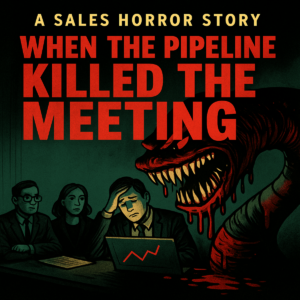Recently, I was talking with one of my business partners here at Convergo. He’d talked with a business owner about moving from a tactical to a strategic approach with their marketing. In principal it sounded good. However, when presented with a relatively modest budget compared to current annual sales revenue, all of a sudden strategic marketing didn’t seem so important.
I get it. I’m a recovering sales rep. In 1993, I took a job with Lanier Worldwide, a hard-charging sales organization that at the time only believed a cold call happened when you walked in the door of a business. At the time, we didn’t even use the phone. We carried demo machines in the back of our vans. It was all about cold call, demo, close. Don’t come back to the office until you have demoed at least two machines.
Having come from a rich heritage of intense sales activity combined with drilled in sales skills, I understand the importance of prospecting.
Fast forward 11 years. In 2004, I found myself training sales reps how to sell solutions. In my industry, that meant document management and capture software. After training my first client, the president of the company called me up and said, “Darrell, what you taught our salesforce was great. However, our website doesn’t say anything about what you just taught us. Do you build websites?”
This business owner recognized something critical: buyers are forming opinions about his company and his competitors based on what they learn online. Investing in improving his online presence is a high leverage investment.
Not investing in online marketing is like putting out an anchor behind the revenue boat while you gun the sales engines.
You may make some progress, but you’re slowing the boat down. I wonder how many sales teams feel like something is slowing their progress and dragging them down?
Being as it was my first client, my answer to his question about building a website was, “Yes!” I dusted off my marketing degree and got to work building the first website for what would become a 15-year journey into aligning online marketing with field sales.
Earlier this month, the internet celebrated its 30th anniversary. We’re now in our fourth decade of buyers being able to go online to find information and form opinions about potential vendors and salespeople.
The fourth decade of the internet — and still some sales leaders and business owners resist dedicating even a modest amount of budget to online marketing. When you look at their websites and social media presence, you can tell that they are at best an afterthought.
This month, as we’re beginning to promote our Fanatical Prospecting training, I’ve been working back through our CRM to call sales VP’s. As I visit websites and social media pages of these companies before I call them, I’m shocked at the lack of attention that has been paid to their online presence. Most of these companies I know provide great customer service, have great products, and hire great people. Yet for all their attention to organizational excellence, their marketing seems stuck in the early 1990’s.
Sales Leaders: Why Should You Invest In Marketing?
This is a fair question. I get it. Let me give you three things to consider.
Marketing (Or Lack Thereof) Affects Every Sale
The first reality is that your marketing affects every sale. Before and after (and sometimes during) each meeting with your sales reps your buyers are online. They are looking at your website. They are looking at your competitors. Just as they form opinions about your salespeople by how they dress and carry themselves (not to mention their LinkedIn profiles…) they are forming impressions about your company.
The company that invests to continually improve their website will stay current with online trends. The company that doesn’t will look incompetent.
Earlier this week I actually visited a website of a business selling security as part of their value proposition that didn’t have a security certificate on their website. As a result, Chrome flagged their website as suspicious and I had to “accept the risk” to visit it. Imagine what a drag this is on their sales. (I called the president of the company and the VP of sales to let them know about the issue. Neither has called me back because they are probably too busy trying to sell. Complete insanity.)
Marketing (Or Lack Thereof) Affect Sales You Never Find Out About
Every month, dozens of deals go down in your market that you never find out about. Your salesforce simply cannot turn over every rock at the right time. Plus, most of today’s buyers begin their purchase journey online. Marketing is what gets you found by potential buyers. Consider the following:
- If you don’t get found online, you’ll miss out on buyers who are looking for what you sell.
- If you DO get found online and don’t have a compelling web presence that they find valuable, people hit the back button. You won’t even know they were there.
- If potential buyers do stay on your website, are there strategies to help identify who is there like compelling calls-to-action (CTAs), online chat, and visitor ID? If not, you’ll never capture the leads.
- If no one is watching the website, following up on leads, answering chats, and identifying visitors, you miss out as well. (I think companies need to consider a Lead Manager.)
{{cta(‘445909c9-6238-4958-8cbe-4bbdd23f8ad8′,’justifycenter’)}}
Marketing (or Lack Thereof) Affects Cross Selling
How many times over the past 20 years have businesses invested in new programs around important ventures to find disappointing success rates? Hundreds of thousands of dollars invested in personnel, training, inventory, and partners go down the drain.
Why is success so dismal? Most of these businesses have one thing in common: they didn’t seriously consider their marketing. Look at their website and you realize that while the business offerings grew, their message is still the same. Ask most of their customers if they know about the new service and they shake their heads “no” because there never was a concerted marketing effort to get the word out. Ask Google who sells IT services in the market and the business doesn’t show up on page one.
Cross-selling requires marketing. Do not attempt to launch a new business line without budgeting for marketing.
How Do You Swallow A Marketing Budget?
As a sales-focused leader, when you look at a monthly marketing budget no matter how big or small it is, I know that you want to choke. However, if you realize that every sale is impacted by marketing, you can take that budget and do two things:
- Divide your marketing budget by the average number of sales (or machines) you averaged per month last year. That is your marketing cost per sale. So, if you’re considering a $3,000/month marketing budget and you averaged 20 deals per month, your marketing cost per deal is $150.
- Divide your marketing budget by the number of sales reps. If you have 10 reps and your marketing budget is $3,000, your marketing cost-per-rep per month is $300.
Some companies pack overhead expenses into the sales cost of goods. You might consider doing the same. Whatever you do, you need to put some money toward marketing. It needs to happen over a sustained period of time. In today’s market, it’s not an option.
The U.S. Small Business Administration recommends spending 7 to 8 percent of your gross revenue for marketing and advertising. I don’t think businesses need to spend that much. But they do need to invest something:
- $2.5 million revenue: 2.5% of $2.5 million = $62,500 marketing budget
- $5 million revenue: 2.5% of $5 million = $125,000 marketing budget
- $10 million revenue: 2.5% of $10 million = $250,000 marketing budget
What are you spending in marketing? If the number is negligible, you have to wonder how much your lack of investment is costing you in lost sales? That $5 million business that wants to get to $10 million and the $10 million business that wants to get to $20 million need to consider how much of a drag their lack of marketing actually is costing them.
You need to make a decision about what % of revenue you’ll invest in your marketing. Consider that part of your cost of sales. Whatever the number is, marketing is not an option. You need to do more than present a half-baked effort online. It’s a necessary investment. It will continue to become more important.
Since it touches every sale, marketing it has the potential to improve win rates and gross profit while supporting cross-selling and generating leads. Of course, I recommend partnering with a company like Convergo that understands the industry, is led by salespeople, and focuses on driving net-new business. This will help yield better results than the well-meaning folks at the local brand agencies that don’t understand what you sell and have never carried a bag.
If you’re a sales-centered person like me, I challenge you to take a fresh look at marketing as a key part of your sales success. If you’d like to discuss, I’d love to talk.
*This article originally appeared on LinkedIn Pulse on March 27, 2019.




